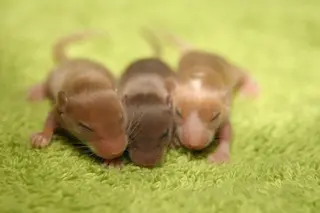(Inside Science) — Perhaps it’s not a coincidence that Valentine’s Day falls at a chilly time of year. In biological terms, social drives like love may be bound up with the need to keep warm.
The same hormone, oxytocin, helps regulate both physical and emotional warmth, increasing body heat and facilitating social bonding. And according to recent research, baby mice deprived of the hormone are less likely to cuddle with other mice or crawl toward heated surfaces.
“We’re working with infant mice, but some of these mechanisms may be relevant to understanding adults, including adult humans,” said Christopher Harshaw, a behavioral neuroscientist at the University of New Orleans and first author of the study, which was published last year in the journal Hormones and Behavior.
Oxytocin has been nicknamed “the love hormone” for its role in social behavior and emotion. Studies suggest it can promote trust, generosity and empathy in ...














